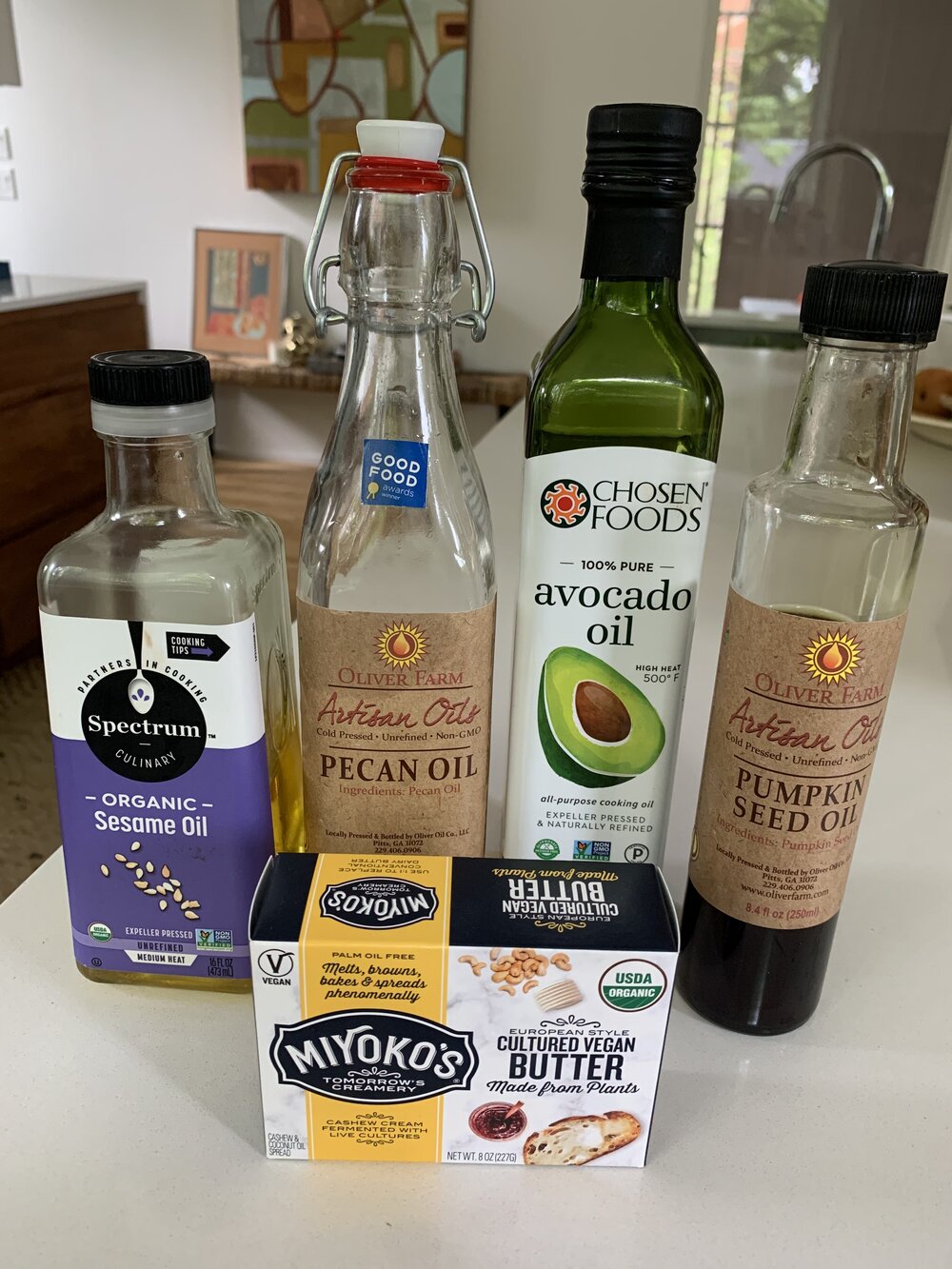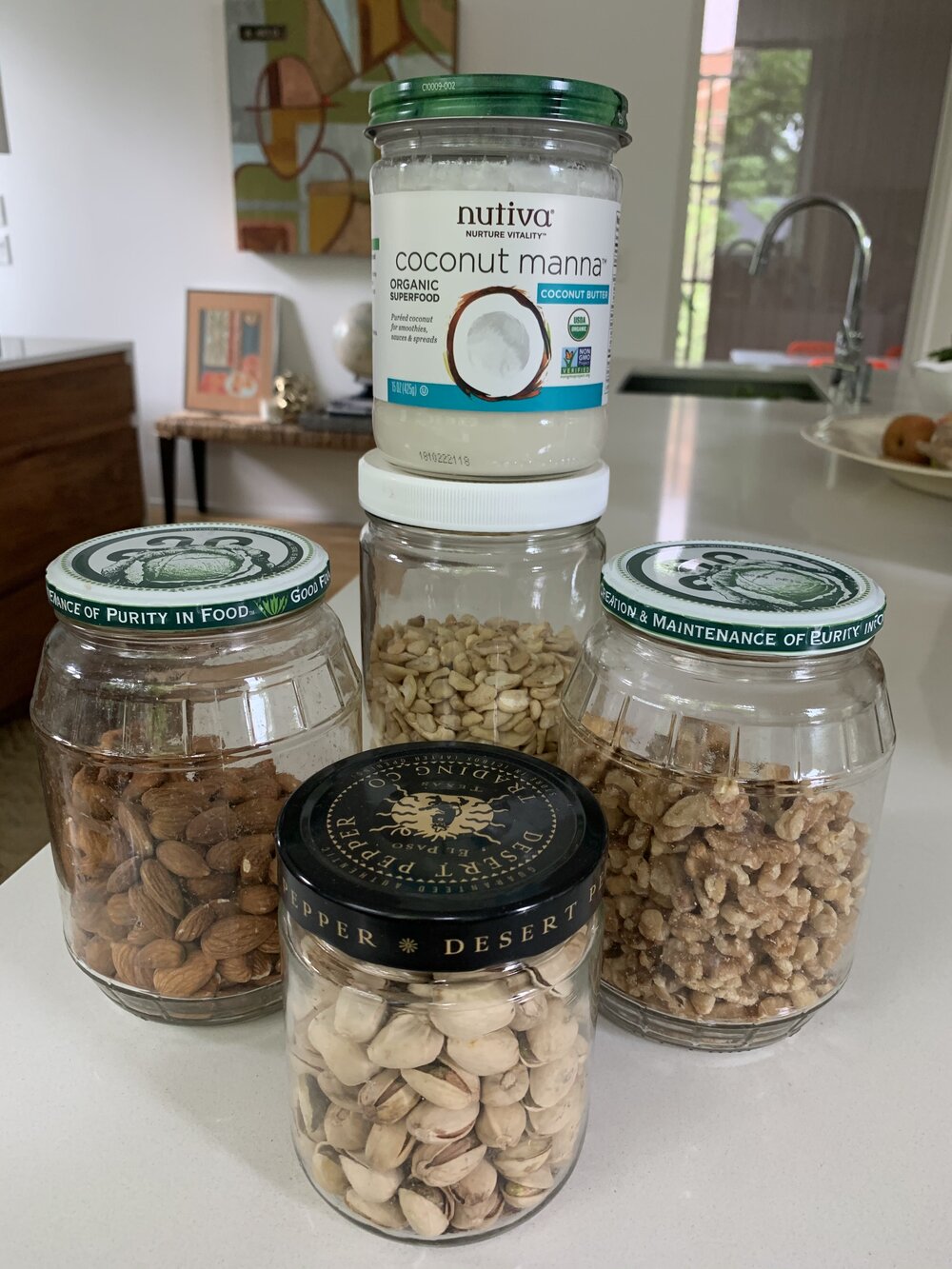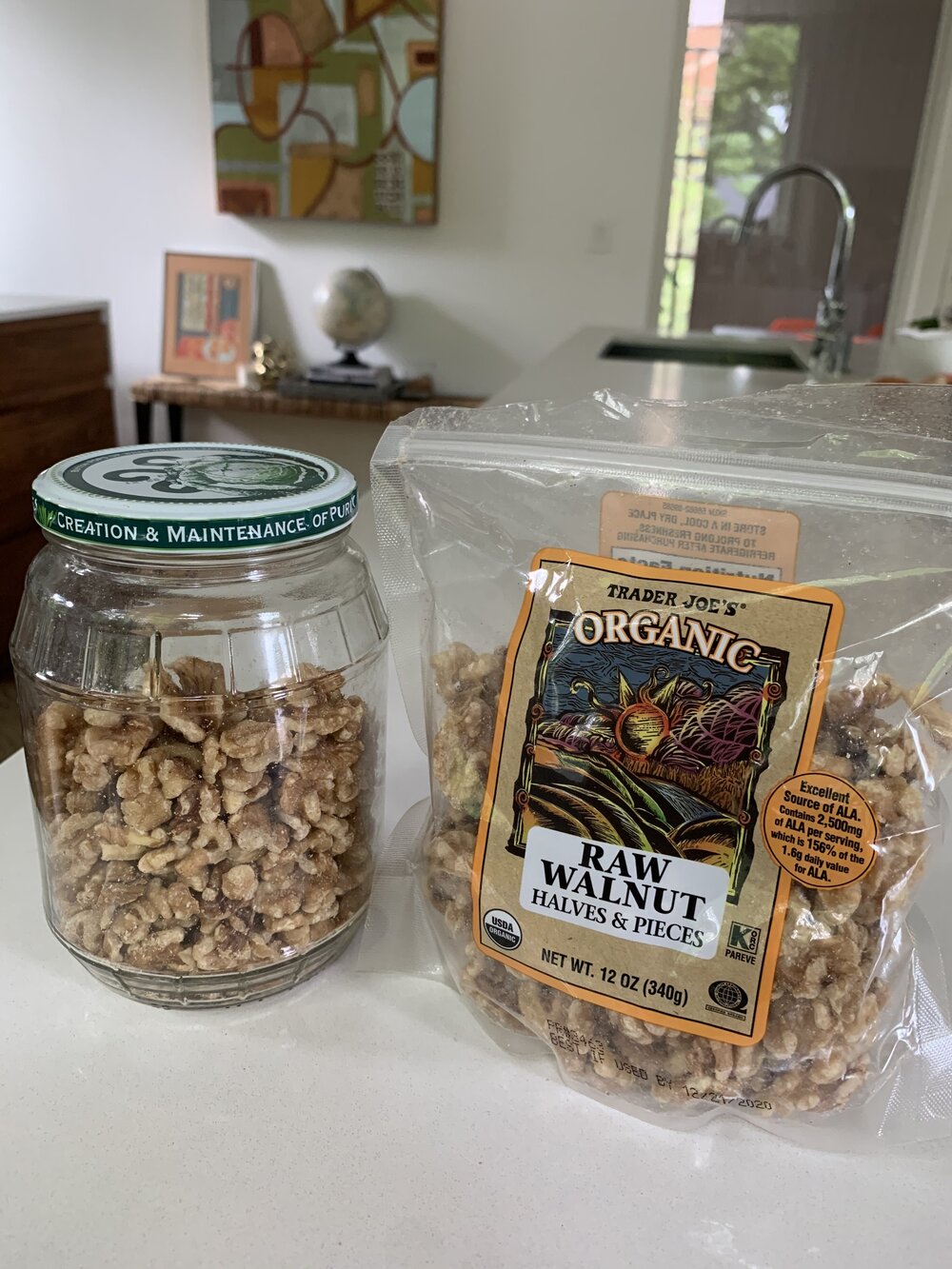
Having a variety of good fats that you and your taste buds enjoy eating is key to optimal health!
First thing’s first: we need fat in our diets.
Thankfully long gone is the fat-fearing diet days of the past with low-fat and fat-free products! Fats are essential for long-term energy, cell growth and communication, organ protection, insulation for your body, nutrient absorption, and hormone production.
So yes, your body definitely requires good fats.
There are numerous diets out there that are either at one extreme of the “fat spectrum” or the other. For example, eating a fully-raw or a HCLF (high carb, low fat) diet consists of 10% or less fat from oils, nuts, meat, eggs, butter and other dairy products. On the other hand, there’s the keto diet in which people consume a diet consisting of 75% fat or more.
In my opinion, these extremes are not only unsustainable, but also they can lead to many nutrient deficiencies. Think fat-soluble vitamin and nutrient deficiencies with a low-fat diet or a fiber, B vitamins, and other nutrient deficiencies in high-fat diets.
Not/Hnat good!

FAT: I love to have a variety of nuts, seeds, and fats available to fuel my body for optimal health!
Let’s break down the four different kinds of fats – monounsaturated, polyunsaturated and saturated fat.
-
Monounsaturated Fats
Monounsaturated fats [mono = 1] have a single carbon-to-carbon double bond. This structure keeps these fats liquid at room temperature.
Common monounsaturated fats include: olive oil, peanut oil, canola oil, avocados, and most nuts, as well as high-oleic safflower and sunflower oils.
-
Polyunsaturated Fats
A polyunsaturated fat [poly = many] has two or more double bonds in its carbon chain. Polyunsaturated fats are essential fats because your body can’t make them and they are required for normal body functions. So you must get these essential fatty acids {EFA’s}from food. There are two main types of polyunsaturated fats: omega-3 fatty acids and omega-6 fatty acids.
a. Omega-3 fatty acids are key because they prevent cardiovascular heart disease and found in fatty fish such as salmon, mackerel, and sardines, flaxseeds, walnuts, canola oil, and non hydrogenated soybean oil. Overall, people are not consuming enough omega-3s due to a high consumption of processed foods and meat (not whole nuts, seeds, and fatty fish). The key with O-3’s is that research shows a powerful link with omega-3s and heart disease and stroke.
b. Omega-6 fatty acids are found in things such as vegetable oils [safflower, soybean, sunflower, walnut, and corn oils], cured meats, eggs, red meats, and processed foods [chips, fried foods]. These fatty acids are pro-inflammatory in the body, leading us to be more susceptible to disease, illnesses, fatigue, etc. The recommended ratio of omega-6 to omega-3 is 4:1 or less. Currently, the typical Western diet has an unbalanced ratio of somewhere between 10:1 and 50:1. Yes my {MIT} – let that sink in.
Common polyunsaturated fats include: Corn oil, sunflower oil, and safflower oil which are all the pro-inflammatory O-6 variety. This doesn’t mean to totally avoid poly’s, it just means be mindful of flooding the diet with these kinds of fats and focus on a variety of O-3’s for balance.

I love to store packaged fats in glass jars to help maintain the integrity of the fatty acids that can oxidize when exposed to the air (using recycled sauerkraut jars here).
3. Saturated Fats
These fats are named after their chain of carbon atoms holding as many hydrogen atoms as possible (it’s saturated with hydrogens!). An easy way to identify these fats are by their characteristic of being solid at room temperature. Saturated fat has had a complicated history with the health world: good fat, bad fat, good(?) fat??
Back in the 1980’s when the first Dietary Guidelines of America were released, saturated fat was considered a villain to a healthy diet. It was stated that consumption of saturated fat was the leading cause of heart disease and death from it.
Nowadays, research on AOCS.org shows that there is a continued lack of consistent evidence showing that dietary saturated fats cause heart disease and refined sugar may play a greater role than previously thought. This is not to label saturated fats or sugar as “bad” foods. The focus is on quality saturated fats and limit those sources that, additionally, have cholesterol and unwanted hormones (cheese, eggs, butter).
Common items with saturated fat include: butter, coconut oil, cooled bacon grease, cheese, red meats, whole milk and its products, and baked goods.
Curious about more information on saturated fat’s history? Read more from a reputable source HERE.
4. Trans Fats
Trans fats (trans fatty acids) are made by heating liquid vegetable oils in the presence of hydrogen gas and a catalyst, a process called hydrogenation. Although these fats have been removed from many common food items these days (due to the spread of the knowledge that they can raise LDL and create inflammation), there are ingredients that should always be red flags that mean trans fats.
Trans fat ingredients to be mindful of: partially hydrogenated oil and vegetable shortening (read the ingredient label to see if the product contain either).
Now that you’re a fat expert, let’s dive into the oils:
Olive Oil
Olive oil is the natural oil extracted from olives, the fruit of the olive tree. Olive oil is considered a monounsaturated fat and is definitely the better choice when it comes to comparing it to saturated or trans fats. In addition, olive oil has a generally high smoke point (the temperature at which the oil starts to smoke/burn when cooking) of 350 degrees for extra-virgin olive oil (EVOO) or 390 degrees for regular olive oil.
This means, if you are preheating your oven to 400 degrees or more to roast some vegetables, don’t use this oil! There has also been research on the anti-inflammatory benefits of olive oil from antioxidant content. The MVP is oleocanthal, which works in the body like the OTC anti-inflammatory drug, ibuprofen.
The not-so-glamorous news about olive oil is similar to the supplement industry. It is so largely produced that often times the regulations, standards, and sources are not verified or even regulated. Adulterated versions of olive oil are often cut with cheaper oils like hazelnut and sunflower seed.
In fact, according to a recent New Yorker magazine, olive oil was the “most adulterated agricultural product in the European Union” and is not tested by the FDA. Even in America the oil is often cut with soybean and seed oils. You can see how this becomes a significant food fraud issue when it’s mislabeled as “extra-virgin” or EVOO.
So although this oil is generally one of the healthier options when it comes to choosing oils, it’s important to keep in mind that there are many forms of olive oil and the labels on the bottle may not live up to the true quality.
For more information on olive oil HERE and for more information on the olive oil fraud/industry HERE.
Avocado Oil (our personal fav!)
Avocado oil is another monounsaturated fat that has gained lots of popularity these past few years. Do it’s facts truly live up to the hype? (hint: YES) In addition to being a great source of fat to help with specific nutrient absorption, avocado oil neutralizes free radicals (the waste products of metabolism that can lead to cellular damage). Also, this oil has a smoke point of 520F degrees (so you can feel good about tossing your veggies in avocado oil and popping them in your 425 degree oven).
For those with sensitive digestive tracts, this oil is a great everyday oil choice. Its mild taste allows for the flavor of your food to shine through and will leave you satiated, especially when used in a balanced carbohydrate-protein-fat meal. You can feel good when using this oil when preparing foods for those in your family of all ages and health conditions!
Additional information HERE.
Coconut Oil
Coconut oil has also had its days in the spotlight recently and has even been labeled a “superfood”. This oil is actually considered a saturated fat, in the same category as butter and cheese. Then how in the world is this oil considered a superfood?!
Well, here are some benefits that get highlighted: coconut oil has antimicrobial effects (lauric acid) to fight off fungi and other pathogens, and it contains MCT’s (medium-chain triglycerides) which can often be used more readily for energy than long-chain triglycerides.
Coconut oil can be great in baking sweets as well as adding the nutty flavor to dishes like curry, but keep in mind it is a saturated fat and is suggested to be used in moderation. If you’re now realizing you’ve just bought a Costco-sized jar of coconut oil and not sure if you’ll ever use it up, I suggest using it as a face moisturizer!
Simply put some of the solid oil on your fingers, rub it around until it melts a bit, and then rub it on your face for a mega-moisturizing feel (great for sunburnt skin, in the winter, or even nightly).
Additional information on coconut oil HERE.
Canola Oil
This vastly-used oil is found in many dishes served in restaurants and other pre-prepared foods. The popularity and use of canola oil is due to its relatively low price and easy accessibility. We all love to save money, but when it comes to oil, the price reflects its quality. Canola oil is made from the cross breeding of plants.
This means it is a genetically modified product. “In fact, over 90% of the canola crops grown in the United States are GMO” (healthline.com). Because of its mass production and use, not only in our food, but animal feed and fuel alternatives, creates an oil that is very low in nutrients.
Canola oil is promoted as a monounsaturated fat, but its process is unlike those of avocado or olive oil. Canola oil is highly refined, bleached and deodorized which indicates a highly processed food. This leaves the oil to lack nutrients, antioxidants, anti-inflammatory properties (it can actually increases inflammation), and nutrient-absorption properties.
Additional information HERE.
Summary
After all this being said, there’s no wonder that there’s so much confusion about which oils to use when cooking. Let’s bring it back to the basics and know: oil is fat and it is necessary we consume fats daily for proper nutrient absorption, brain function, hormonal balance, and cell function. Additionally, our bodies are made up of millions of cells and cells are coated in a fatty bilayer used for communication. So, let’s fuel our bodies with the best oil that we can because the quality of our oil = the quality of our cell communication.
Overall, we suggest making avocado oil your primary go-to oil for daily use. In addition to this, it is totally okay to consume different oils! They each give us different nutrients, amounts of fat, and tastes for different dishes. Enjoy those dishes that your favorite restaurant makes with canola oil and just know that you can always control what is cooked in your home, and as always, it’s all about balance and listening to your body!
JENNIFER WEIGHS IN:
So let me just say that when I learned about the role of fats in the body, REALLY understood how vital good fats are to the body’s communication system, I started to rethink how I spent my money.
Health is wealth, right? Well, if you really REALLY care about your health, then you’ll invest your hard earned money in good quality fats. My fave right now is avocado oil, pecan and pumpkin seed oil, nuts, seeds. Essentially crappy fats are like dial-up communication in the body and good quality (albeit more expensive) fats like avocado oil are high speed internet. Personally, I’m investing in top-speed cellular communication!
So yes, I’m spending good money for high-quality fats. And after learning about the tainted olive oils from a NYTimes article, my new default became avocado oil (praying that this industry is not/Hnat tainted like EVOO). I used to use a ton of coconut oil but now use it sparingly and mostly save it for my hair and skin. It’s a great natural lotion replacement, especially in the summer since it has a cooling effect on the body.
And I’m going to personally address canola oil because I get a lot of clients who ask my take on it. Hnat a fan. YES, it’s a monounsaturated fat. But it’s so highly processed and doesn’t agree with my GI that I’d rather stick with more whole food fats like avocado, nuts and seeds + less processed oils.
And on the topic of fat… I TOTALLY get the appeal of the keto diet. I do. It’s sounds like the answer to so many client’s weight struggles. BUT, and that’s a big BUT it also comes with numerous risks including liver and kidney problems, constipation, nutritional deficiencies, and mood swings + cloudy thinking due to low carb intake on the brain.
I mean, how can a diet that promotes so much butter and meat honestly be the ideal health strategy when we know that high-fiber, nutrient-dense plants are the superstars in the body. So if you’re smart, you’ll take a big pass on the keto diet. Reputable info from Harvard Health Publishing HERE.
Personally, I’m beyond grateful to not/Hnat track macros and calories, and instead focus on mindful + intuitive eating to create a sustainable relationship with food. As I always say, if I could have a do-over, it’s something I would have invested mental space in a long, long time ago!
REFERENCES:
https://www.healthline.com/nutrition/ketogenic-diet-101
https://www.heart.org/en/healthy-living/healthy-eating/eat-smart/fats/dietary-fats
https://www.health.harvard.edu/staying-healthy/the-truth-about-fats-bad-and-good
https://www.health.harvard.edu/staying-healthy/do-omega-3s-protect-your-thinking-skills
https://www.healthline.com/nutrition/omega-3-6-9-overview
https://www.hsph.harvard.edu/nutritionsource/what-should-you-eat/fats-and-cholesterol/types-of-fat/
https://www.healthline.com/nutrition/11-proven-benefits-of-olive-oil#section3
https://www.healthline.com/nutrition/9-avocado-oil-benefits#section1
https://www.healthline.com/nutrition/top-10-evidence-based-health-benefits-of-coconut-oil
https://www.healthline.com/nutrition/is-canola-oil-healthy#alternatives
https://www.newyorker.com/books/page-turner/olive-oils-dark-side

